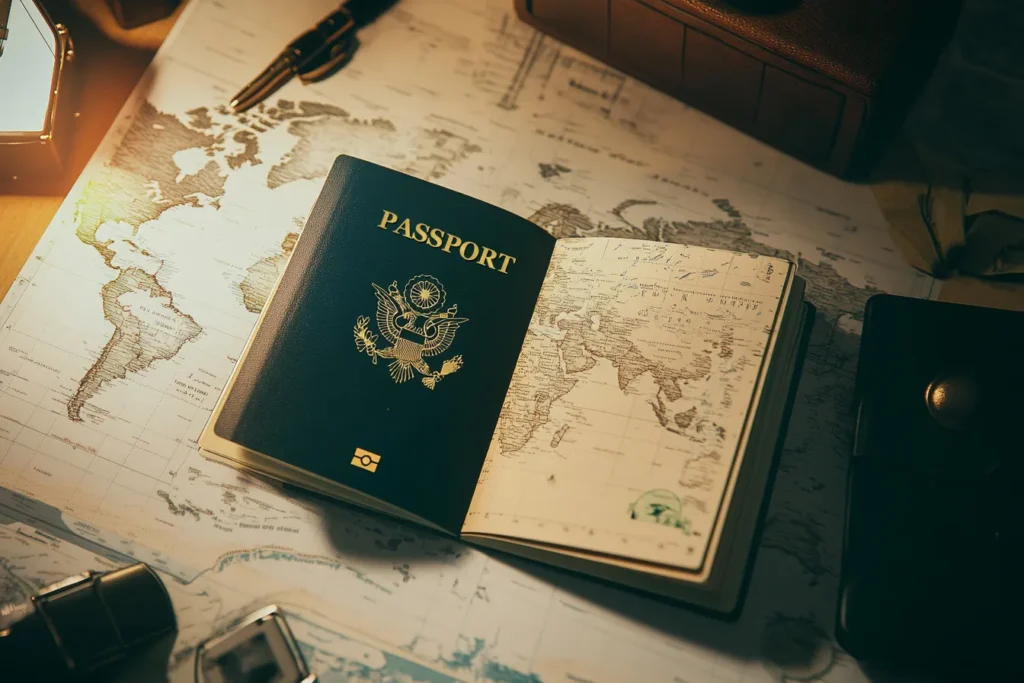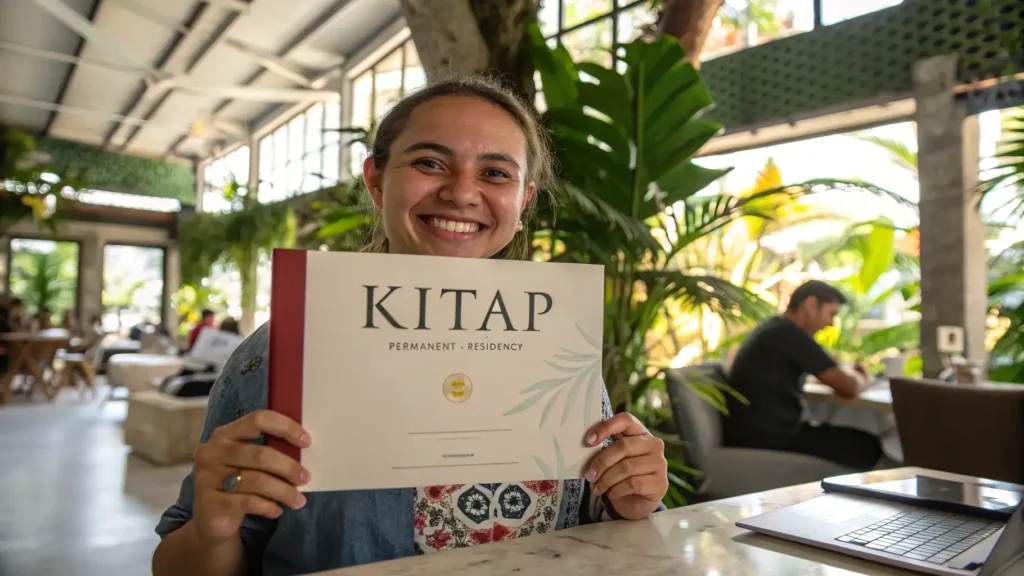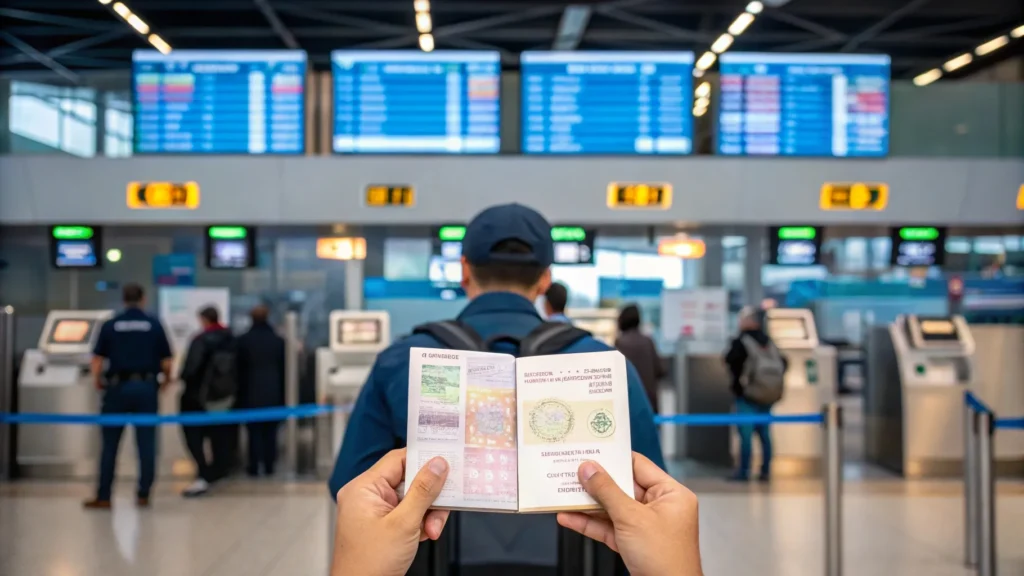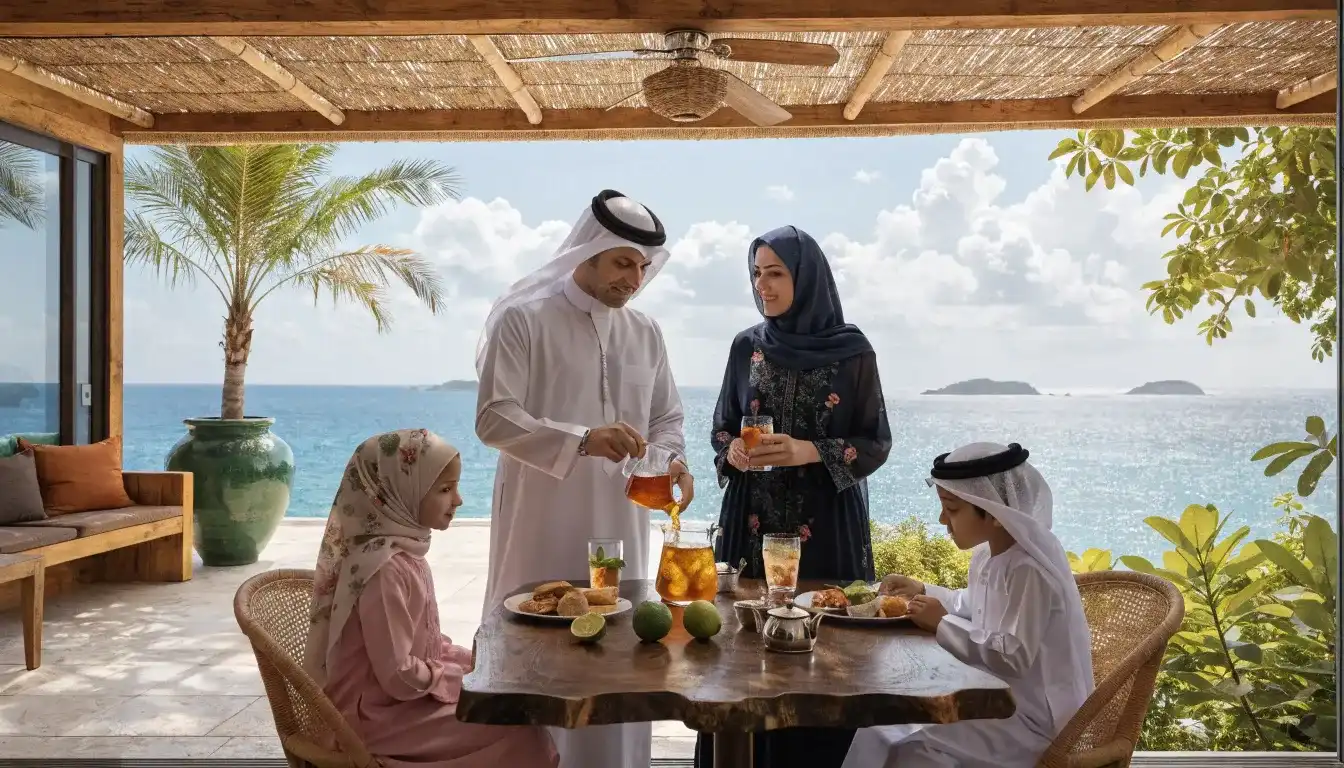The Difference Between Visa and Residence Permit: What You Need to Know Before Applying
oktarina
September 27, 2025
16 min read

If you’re planning to travel or live abroad, one crucial thing you need to understand is the difference between a visa and a residence permit. While both are official documents that determine your legal status in a foreign country, they have significant differences. Understanding the difference between visa and residence permit will help you choose the right document for your needs. This way, you can understand when and for what purpose you need to apply for a visa or residence permit.
In this article, we will explain in detail the differences between a visa and a residence permit. Keep reading until the end to get more insights, as this information will greatly help your travel or plans to live abroad. We will dive deeper into when and how to apply for a visa or residence permit, as well as the requirements you need to fulfill to make the application process smoother and faster.
What Is a Visa?

A visa is an official document issued by a country’s government that grants someone permission to enter and stay in that country for a specific period. It serves as approval for the holder to travel to the issuing country for a particular purpose, such as tourism, temporary work, or education.
In Indonesia, a visa is required for foreign nationals who wish to enter the country for various purposes. There are several types of visas that can be applied for, depending on the purpose of your visit, such as:
- Tourist Visa – For vacation or leisure trips, typically with a limited duration.
- Business Visa – For those visiting for business purposes, such as meetings or conferences.
- Work Visa – For foreign nationals coming to work in Indonesia for a specific period.
- Student Visa – For those coming to study or participate in educational programs in Indonesia.
A visa is required if you plan to stay longer than the period allowed by the visa-free entry for some countries. For instance, certain nationals can visit Indonesia without a visa for up to 30 days, but if they wish to stay longer or for another purpose, they must apply for a visa.
The visa application process in Indonesia involves gathering certain documents, such as a valid passport, visa application form, proof of financial means, and other supporting documents based on the type of visa being applied for. A visa is temporary and can be extended according to the applicable regulations.
What Is a Residence Permit?

A residence permit is an official document granted by a government that allows someone to stay longer in the country, sometimes permanently. Unlike a visa, which is typically valid for a set time, a residence permit allows the holder to legally stay in the country for a longer period, depending on the type of permit granted.
In Indonesia, a residence permit is required for foreign nationals planning to stay longer than the permitted period with a visa or visa-free entry. Some reasons for needing a residence permit in Indonesia include:
- Work – Foreign nationals who want to work in Indonesia for a longer period must apply for a work permit, such as a KITAS (Temporary Stay Permit) or KITAP (Permanent Stay Permit), depending on the job duration and status.
- Study – Foreign students who wish to continue their studies in Indonesia for a longer period also need to apply for a residence permit in the form of a student visa, which can be extended as long as they are enrolled in an educational institution.
- Family Reasons – Residence permits are also required for family members of foreign nationals who are living in Indonesia for purposes like family reunification or living with a spouse who works or studies in Indonesia.
A residence permit in Indonesia allows a longer stay and regulates the status of an individual in the country, whether for work, study, or family purposes. This permit can be renewed or extended according to the applicable rules.
The Difference Between Visa and Residence Permit
When planning to travel or live abroad, it is important to understand the different types of permits required, especially the difference between visa and residence permit. While both allow you to stay in a particular country, they serve different functions, durations, and requirements. Understanding the difference between visa and residence permit is essential to ensure you choose the right document for your travel or living plans. Below, we’ll explain the key differences between visas and residence permits and how they are applied in various immigration situations:
| Aspect | Visa | Residence Permit |
| Purpose and Function | For temporary purposes such as tourism, temporary work, or study. | For longer or permanent stay (work, study, family reasons). |
| Duration | Short-term, usually from a few days to a few months. | Longer-term, can be extended or permanent. |
| Rights and Obligations | Limited rights, e.g., for tourism or temporary work only. | Broader rights, including working, studying, and staying longer. |
| Application Process | Simpler and faster application process. | More complex, requiring stricter verification. |
| Possibility of Extension | Can be extended (depending on the visa type), but limited. | Can be extended or converted to permanent stay permit. |
| Impact on Immigration Status | Does not grant full immigration status. | Grants a more formal immigration status. |
| Payment Process and Fees | Lower fees, usually for temporary permits. | Higher fees, often with annual costs for maintaining the permit. |
| Opportunity for Citizenship | No right to apply for citizenship. | Allows the possibility to apply for citizenship after staying for several years. |
1. Purpose and Function
- Visa:
A visa is granted for temporary purposes, such as vacation, temporary work, or study. It allows the holder to enter and stay in the country for a limited time, according to the purpose stated in the visa application. A visa is only valid for specific activities, such as a tourist visiting for leisure or a temporary worker coming to work for a limited time. - Residence Permit:
A residence permit is granted to someone who intends to stay longer in the country, either for work, education, or family reasons. A residence permit allows an individual to stay for the long term or even permanently, depending on the permit type issued. This permit provides more flexibility, as it allows the holder to live, work, and engage in other activities compared to a temporary visa.
2. Duration
- Visa:
A visa typically has a shorter duration. Visas are usually issued for periods ranging from a few days to several months, depending on the type of visa and the issuing country’s policy. For example, a tourist visa may be granted for 30 days, while a business or student visa can last up to 6 months or more, but still within a limited time frame. - Residence Permit:
A residence permit is valid for a much longer period. In some countries, the holder of a residence permit can stay for several years and even extend it or convert it to permanent residency. For example, in Indonesia, holders of KITAS (Temporary Stay Permit) can stay for 1-2 years and extend it, while KITAP (Permanent Stay Permit) grants permanent residency.
3. Rights and Obligations
- Visa:
Visa holders have limited rights. These rights depend on the type of visa granted. For instance, a tourist visa only allows the holder to travel and cannot work or engage in business activities. If a person wishes to work or do other activities, they must apply for an additional visa or change their visa status. - Residence Permit:
Holders of residence permits, especially KITAP or KITAS, are granted the right to stay longer in the country and can work, study, and engage in other activities without restrictions. In some cases, residence permit holders may also gain access to services like healthcare or other public facilities that are generally limited to visa holders.
4. Application Process
- Visa:
Applying for a visa is generally simpler and quicker compared to a residence permit. The process usually involves filling out an application form, providing a valid passport, and submitting supporting documents such as travel tickets and proof of financial means. Visa applications can often be done online, with a decision typically made quickly. - Residence Permit:
The process for applying for a residence permit is much more complex and requires stricter verification. Applicants may need to show more substantial proof of employment or education status, as well as stable finances. In some cases, applicants may also need to undergo health checks, language tests, or interviews. This process can take several months to be approved, especially for permanent residency permits.
5. Extension Possibility
- Visa:
Visas often have strict time limits and are not always extendable, depending on the type of visa and the country’s policy. Some visas can be extended for a short period, while others, such as tourist visas, cannot be extended. Once the visa expires, the holder must leave the country and reapply for a new visa if needed. - Residence Permit:
A residence permit is more flexible and can be extended or changed based on the holder’s status. For instance, someone with a KITAS (Temporary Stay Permit) can extend their stay with proof of employment or family relationships. In countries like Indonesia, a KITAP (Permanent Stay Permit) can be acquired after several years with a KITAS, allowing for permanent residence without restrictions.
6. Impact on Immigration Status
- Visa:
Holding a visa does not grant full immigration status in the country. A visa only permits temporary residence in the country for the stated purpose in the application. The holder of a visa does not have the right to stay permanently or apply for citizenship without further procedures. - Residence Permit:
A residence permit grants a more official immigration status in the country. By holding a residence permit, an individual has the right to stay longer and may have access to various local services. Furthermore, with a permanent residence permit (such as a KITAP), an individual can apply for citizenship or permanent residence status after meeting certain criteria.
7. Application Fees and Costs
- Visa:
The application fee for a visa is usually lower and only covers the administrative cost for temporary stay. The fee varies depending on the type of visa and the destination country. - Residence Permit:
The application fee for a residence permit is generally higher and often more expensive due to the longer process and more in-depth verification. Some countries also charge an annual fee to maintain the permit, which is typically higher than for a temporary visa.
8. Opportunity for Citizenship
- Visa:
With a visa, an individual does not have the right to apply for citizenship in the country. A visa only grants temporary permission to stay and does not change an individual’s immigration status to permanent residency or citizenship. - Residence Permit:
Holders of residence permits, especially those with a KITAP (Permanent Stay Permit), have a higher chance of applying for citizenship after several years of residing in the country. Many countries allow permanent residence holders to apply for citizenship or permanent residency after meeting certain requirements, such as length of stay or social integration.
Read more: How To Extend Bali Visa New Rules: Your Guide for the 2025 Regulations
When Should You Apply for a Visa or Residence Permit?

Choosing between a visa and a residence permit depends on your purpose and the length of stay in the destination country. Both documents serve different functions, and knowing when and which one to apply for will simplify your immigration process and stay abroad. Here’s a detailed guide to help you determine when to apply for a visa or residence permit:
1. Visa
A visa is the right choice if you plan to stay temporarily or for a short-term purpose. Here are situations when a visa is appropriate:
- Vacation or Leisure
If your purpose is vacation or exploring new places, a tourist visa is the right choice. It allows you to stay in the country for a specific period, usually 30 to 90 days.
Example: A two-week holiday in Bali or a European tour. - Business Meeting or Conference
A business visa is necessary if you’re attending a meeting, seminar, or international conference. This allows you to stay temporarily for professional purposes.
Example: A business meeting in Japan or a conference in Singapore. - Visiting Family or Friends
If you want to visit family or friends abroad, a visitor visa allows you to stay temporarily, typically for a few months.
Example: Visiting parents working overseas or attending a friend’s wedding. - Short Training or Course
If you’re attending a training or short educational program lasting under 6 months, a student or training visa is the best option.
Example: A 3-month English language course in the UK.
When to Apply for a Visa:
- If your goal is to travel or attend a short event.
- If you don’t plan to stay longer than 6 months.
- If you don’t intend to work or engage in activities other than the stated purpose (e.g., tourism or business meetings).
2. Residence Permit
A residence permit is the right choice if you plan to stay longer in the destination country, either for work, study, or permanent residency. Here are situations when a residence permit is necessary:
- Work Abroad
If you get a job abroad and plan to stay for a longer period, you need a residence permit. Generally, you must first have a work visa, which can later be converted into a residence permit after living in the country for some time.
Example: Teaching English in Japan or working as an engineer in Dubai. - Studying Abroad
If you’re planning to pursue long-term studies, a residence permit as an international student is necessary. Some countries even allow part-time work during studies.
Example: A master’s program in Australia or undergraduate studies in the UK. - Joining Family
If you’re married to a local citizen or want to join a family member who’s already living abroad, you’ll need to apply for a residence permit. This applies to spouses, parents, or children of citizens already residing in that country.
Example: Marrying a Canadian citizen and applying for a residence permit to live together. - Permanent or Long-Term Stay
If you plan to stay more than 6 months, a residence permit is the right option. Some countries allow you to extend this permit or even change it to permanent residency after a few years.
Example: Applying for KITAP (Permanent Stay Permit) in Indonesia after several years on KITAS (Temporary Stay Permit).
When to Apply for a Residence Permit:
- If you plan to stay longer than 6 months.
- If your purpose is to work or study for an extended period.
- If you want to stay permanently or join family members who are already living in the country.
General Requirements for Applying for a Visa and Residence Permit

Each country has its own specific requirements for applying for a visa or residence permit. However, there are general documents that are typically required for both applications. Here are the common requirements:
1. For Visa
If you plan to apply for a temporary visa, here are the documents often required:
- Valid Passport
Make sure your passport is valid for at least 6 months after your arrival date and has enough blank pages for the visa or entry stamp. - Recent Photo
A recent passport photo that meets embassy specifications, usually with a white background and specific dimensions. - Proof of Financial Means
Bank statements for the last few months or income proof showing that you have enough funds to support yourself during your stay abroad. - Round-Trip Ticket or Proof of Accommodation
A round-trip ticket showing your arrival and departure dates, or proof of accommodation, such as hotel reservations. - Proof of Travel Purpose
Invitation letter or travel itinerary that shows your planned activities in the destination country.
2. For Residence Permit
If you plan to stay longer or settle, such as for work, study, or family reasons, you’ll need a residence permit. Here are the documents typically required:
- Work Contract or Invitation from Educational Institution
For working or studying, you must show your work contract or invitation letter from the institution that has accepted you. - Proof of Legal Residence in the Destination Country
Rental contract or document showing that you have a legal place to stay in the country. - Health Insurance
Proof that you have valid health insurance during your stay in the destination country. - Proof of Financial Means
Bank statements or documents proving that you have sufficient funds to live in the country during your stay.
Tips for Choosing the Right Visa or Residence Permit for Your Needs
Deciding whether you need to apply for a visa or residence permit depends on your purpose and duration of stay in the destination country. Here are some tips to help you choose the right document:
- Determine Your Purpose
Are you planning to travel for a short vacation, work temporarily, or stay longer? If your purpose is simply to travel, visit family, or attend a short event, a visa is the right option. However, if you plan to work long-term, study, or join a family member who is already settled, a residence permit is more suitable. - Consider Duration of Stay
A visa is suitable if you’re staying for a short time, typically less than 6 months. However, if you plan to stay longer, work, or study for an extended period, a residence permit is the better choice because it allows a longer stay, even permanently. - Understand the Application Requirements
Visa applications are generally quicker and easier with fewer requirements. However, applying for a residence permit often involves stricter verification and additional documentation, such as work contracts or proof of accommodation. If you want a simpler process, a visa is a more practical option. - Use Visa Concierge Services
If the visa or residence permit application process seems complicated and time-consuming, using a visa concierge service from Bali Premium Trip can be a huge help. This service will assist you in preparing the necessary documents, handling the application, and ensuring that everything runs smoothly. Our professional team will guide you through every step to make your immigration experience easier and more efficient.
Read more: Residence Permit: A Guide for Foreign Nationals Who Want to Stay in Indonesia
Apply for Your Visa and Residence Permit with Bali Premium Trip!
Understanding the difference between visa and residence permit is crucial for choosing the right document for your travel or living plans. A visa is typically used for short visits, while a residence permit is necessary for longer stays or permanent residency. Knowing when and which one to apply for will help make your journey smoother and prevent future issues.
To make your visa or residence permit application process easier, Bali Premium Trip offers visa concierge services that can help you prepare the necessary documents, handle the application, and ensure that all requirements are met accurately. Our professional team will assist you every step of the way, ensuring your application process goes smoothly without any setbacks.
Don’t let the application process hold back your plans! Contact Bali Premium Trip now and let us handle all your immigration needs!

Related Article
A Discreet 48-Hour Private Relocation from the Gulf to Bali
Bali, with its stunning natural beauty, rich culture, relaxed lifestyle,...
Bali, with its stunning natural beauty, rich culture, relaxed lifestyle, and safety, is becoming an increasingly popular choice for those...
Relocation from Dubai to Bali: The Ultimate Family Guide to Move Securely and Comfortably
Recent operational disruptions announced by Dubai Airports include suspension at...
Recent operational disruptions announced by Dubai Airports include suspension at Dubai International Airport (DXB) and Al Maktoum International Airport (DWC)....
The Ultimate Bali to Komodo Island Private Superyacht Charter: An Elite Concierge Guide
BALI, INDONESIA — At Bali Premium Trip, our high-end concierge...
BALI, INDONESIA — At Bali Premium Trip, our high-end concierge desk caters to the most exclusive travel requests across the...



